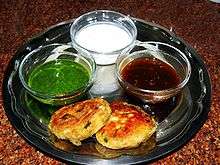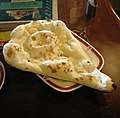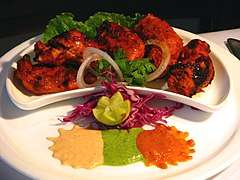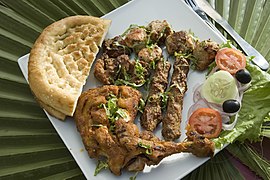Aloo tikki
Aloo tikki is a snack originating from the Indian subcontinent; in North Indian, Pakistani and Bangladeshi preparation, it is made out of boiled potatoes, peas, and various curry spices. "Aloo" means potato, and the word "tikki" means a small cutlet or croquette in Hindi and Marathi. It is served hot and warm along with a side of saunth, tamarind and coriander-mint sauce, and sometimes dahi (yogurt) or chick peas. It is a vegetarian alternative, and an Indian equivalent of the hash brown.
 | |
| Type | Snack |
|---|---|
| Place of origin | Indian Subcontinent |
| Region or state | North India, South India, Bangladesh and Pakistan |
| Serving temperature | Hot |
| Main ingredients | Potatoes, peas, spices, herbs |
| Variations | Ragda pattice |
Variations
In Mumbai, India a popular version of aloo tikki is served with a spicy curry and various chutneys. It is called "Ragda pattice" and is sold on the various chaat stalls throughout the city and especially the Chowpatti Beach.
Aloo tikki is mashed potato patties mixed with coriander, peas and spices, deep-fried in oil. Some North Indian dhabas or café-style eateries will sandwich the aloo in bread.
In the United Kingdom, vegetable tikki is available from delicatessen counters at various shops. It is very popular in the East Midlands area.
As with the majority of cultural and linguistic factors – barring other influences – this cuisine can be found in areas that are essentially all parts of the India. Regional "variants" are prevalent due to the mass size of the country. For example, in Mumbai, aloo tikki is made up of mainly locally grown spices such as turmeric as opposed to Bangalore, where its significance is placed more on the coriander spice.
In Delhi, Uttar Pradesh is known for its aloo tikki and other chaats [1]
Chef Manish Mehrotra probably best describes it by saying "It’s a potato tikki fried on a tava, with silky yogurt and grainy masala. It’s khatta, meetha, and a shade bitter around the charred corners of the tikki — it’s a complete dish." [2]
Sources
- "Purani Delhi Food". delhi tourism.
- Fernando, Benita (3 December 2015). "Why sweet and sour makes the world go yum". Mid Day.




